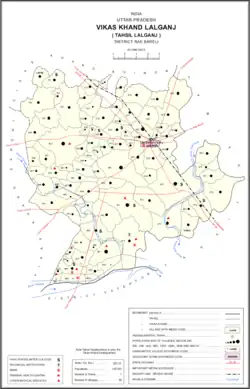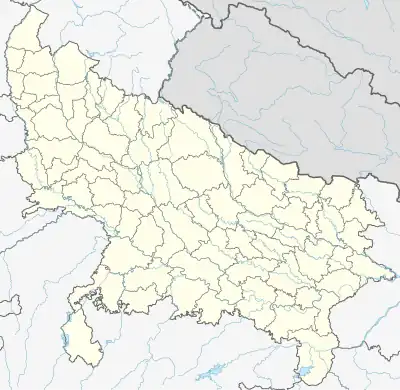Sarai Kurmi
Sarai Kurmi is a village in Lalganj block of Rae Bareli district, Uttar Pradesh, India.[2] It is located 4 km from Lalganj, the block and tehsil headquarters.[3] As of 2011, it has a population of 843 people, in 197 households.[2] It has no healthcare facilities and does not host a permanent market or a weekly haat.[2] It belongs to the nyaya panchayat of Behta Kalan.[4]
Sarai Kurmi
Sarāi Kurmi | |
|---|---|
Village | |
 Map showing Sarai Kurmi (#806) in Lalganj CD block | |
 Sarai Kurmi Location in Uttar Pradesh, India | |
| Coordinates: 26.15584°N 80.874654°E[1] | |
| Country | |
| State | Uttar Pradesh |
| District | Raebareli |
| Area | |
| • Total | 1.783 km2 (0.688 sq mi) |
| Population (2011)[2] | |
| • Total | 843 |
| • Density | 470/km2 (1,200/sq mi) |
| Languages | |
| • Official | Hindi |
| Time zone | UTC+5:30 (IST) |
| Vehicle registration | UP-35 |
The 1951 census recorded Sarai Kurmi as comprising 3 hamlets, with a total population of 452 people (228 male and 224 female), in 85 households and 82 physical houses.[5] The area of the village was given as 440 acres.[5] 25 residents were literate, all male.[5] The village was listed as belonging to the pargana of Sareni and the thana of Sareni.[5]
The 1961 census recorded Sarai Kurmi as comprising 3 hamlets, with a total population of 552 people (263 male and 289 female), in 99 households and 87 physical houses.[6] The area of the village was given as 440 acres.[6]
The 1981 census recorded Sarai Kurmi as having a population of 725 people, in 129 households, and having an area of 178.47 hectares.[3] The main staple foods were listed as wheat and rice.[3]
The 1991 census recorded Sarai Kurmi as having a total population of 773 people (399 male and 374 female), in 150 households and 150 physical houses.[4] The area of the village was listed as 178 hectares.[4] Members of the 0-6 age group numbered 147, or 19% of the total; this group was 54% male (80) and 46% female (67).[4] Members of scheduled castes made up 37% of the village's population, while no members of scheduled tribes were recorded.[4] The literacy rate of the village was 47% (248 men and 112 women).[4] 204 people were classified as main workers (194 men and 10 women), while 0 people were classified as marginal workers; the remaining 569 residents were non-workers.[4] The breakdown of main workers by employment category was as follows: 113 cultivators (i.e. people who owned or leased their own land); 61 agricultural labourers (i.e. people who worked someone else's land in return for payment); 0 workers in livestock, forestry, fishing, hunting, plantations, orchards, etc.; 0 in mining and quarrying; 8 household industry workers; 0 workers employed in other manufacturing, processing, service, and repair roles; 0 construction workers; 0 employed in trade and commerce; 0 employed in transport, storage, and communications; and 22 in other services.[4]
References
- "GeoNames Search". geonames.nga.mil. Archived from the original on 12 April 2014. Retrieved 13 June 2023.
- "Census of India 2011: Uttar Pradesh District Census Handbook - Rae Bareli, Part A (Village and Town Directory)" (PDF). Census 2011 India. pp. 288–306. Retrieved 21 October 2021.
- Census 1981 Uttar Pradesh: District Census Handbook Part XIII-A: Village & Town Directory, District Rae Bareli (PDF). 1982. pp. 136–7. Retrieved 21 October 2021.
- Census 1991 Series-25 Uttar Pradesh Part-XII B Village & Townwise Primary Census Abstract District Census Handbook District Raebareli (PDF). 1992. pp. xxiv–xxviii, 186–7. Retrieved 21 October 2021.
- Census of India, 1951: District Census Handbook Uttar Pradesh (42 - Rae Bareli District) (PDF). Allahabad. 1955. pp. 118–9. Retrieved 21 October 2021.
{{cite book}}: CS1 maint: location missing publisher (link) - Census 1961: District Census Handbook, Uttar Pradesh (39 - Raebareli District) (PDF). Lucknow. 1965. pp. lxxiv-lxxv of section "Dalmau Tahsil". Retrieved 21 October 2021.
{{cite book}}: CS1 maint: location missing publisher (link)